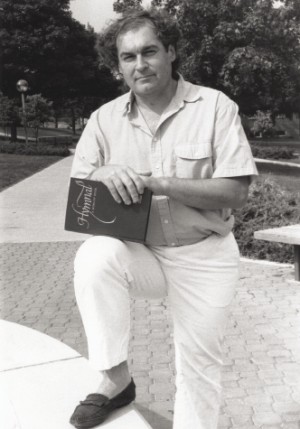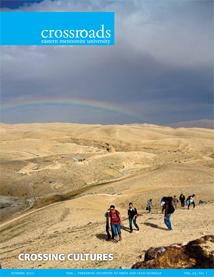
Ken Nafziger was music editor for this 1992-issued hymnal. Photograph courtesy of emu archives.
When President Bill Clinton cracked a window open to Cuba, permitting scholars to apply for education-centered travel permits to Cuba from 1999 to 2003, EMU music professor Ken J. Nafziger seized the opportunity
He brushed off warnings on the U.S. State Department’s website about the possibility of “intense physical and electronic surveillance,” which “may involve detention and interrogation of both Cuban citizens and foreign visitors” and happily made 11 trips to Cuba in just four years, before President George W. Bush closed the window again. (President Obama re-opened it in early 2011.)
Nafziger was indeed “interrogated,” but not by the likes of the secret police, but by talented Cuban musicians eager to collaborate with, teach, and learn from musical artists like Nafziger.
“In my trips to Cuba, when the people sang, played, and listened, I heard an intensity that communicated that they needed singing for the survival of their souls,” recalls Nafziger. He sensed a spiritual depth in Cuba that, ironically, often seems lacking in its far-richer neighbor to the north.
Nafziger’s work in Cuba included major guest conducting appearances with the country’s leading orchestras and choirs, teaching master classes in a variety of musical topics, and participating with musical colleagues in a number of joint projects. In 2001, Nafziger featured Cuban music at his annual Shenandoah Valley Bach Festival. In 2003, he led to Cuba the EMU Chamber Singers, along with a member of the renowned gospel group “Sweet Honey in the Rock,” Ysaye Maria Barnwell.
Long before his forays to Cuba, it was clear that Nafziger was passionate about four things: music, language, travel, and perhaps most of all . . . matters of the spirit, and how the spirit is fed by music-centered worship that unites diverse peoples.
Nafziger began teaching as a music professor at EMU in the fall of 1977. A graduate of Goshen College in Indiana, Nafziger arrived with a doctorate of music from the University of Oregon.
There was a lot of excitement about the cross-cultural program around the time that Ken began teaching at EMU. Nafziger led a group to Poland on his first cross-cultural trip in 1980.
“It was around the time when the Soviet Union was about to collapse and it was a really exciting time to be there,” says Nafziger. “My trips to Poland stand out to me because of the way that the Polish people used art and music. There were so many things that were denied to them—they really enjoyed art and music. It was so significant because they had so little.”
Before teaching at EMU Nafziger had spent time working under a German conductor of music.
“From the years that I lived in Germany, the thing that was most rewarding was being able to converse in German,” recalls Nafziger. As a result, Nafizger-led trips have put much emphasis on learning the language of the host country.
Nafziger led two other cross-cultural trips to Munich, Germany, in 1985 and 1990. “On all of my trips, the students have been very different from each other, but through their experiences they really came together.”
In addition to the designated cross-culturals, Nafziger has conducted choral and orchestral programs in various places, including Canada, Germany, Poland, and the Soviet Union. “All of my trips have been exciting,” says Nafziger, who is married to Helen, MA ’00 (in counseling), retired director of EMU’s career services. “Whether it was language instruction, history, filmmaking, or music, the people were amazing and they really wanted us to experience their culture.”
Asked to articulate the value he places on EMU’s cross-cultural program, he points to the changes he sees in students. “It makes people different and re-creates them in new ways,” he says. “I am astonished the way I am so moved after every trip by what the students have to say when they return. I find myself listening to them with tears running down my face. It truly is an amazing program to be a part of.”
Ken and Helen have three children, Jeremy ’91, Kristen (Parmer) ’93 and Zachary ’01, all of them well-traveled and involved in the arts—doing writing, visual art, graphic design, and/or church music.
—Rachael Keshishian & Bonnie Price Lofton
